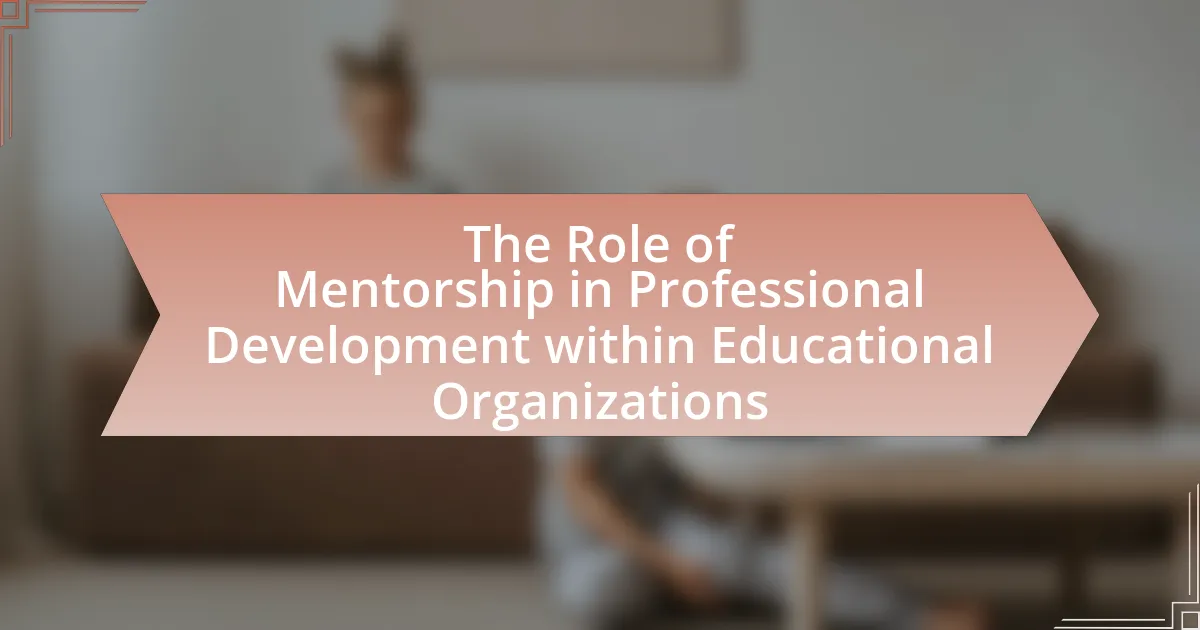Mentorship is a vital component of professional development within educational organizations, facilitating knowledge transfer, skill enhancement, and personal growth among educators. This article explores the significant impact of mentorship on job satisfaction, teacher retention rates, and student outcomes, supported by research findings. Key elements of effective mentorship, variations across different educational contexts, and the challenges organizations face in implementing mentorship programs are also examined. Additionally, best practices for establishing mentorship initiatives and assessing their effectiveness are discussed, highlighting the importance of structured programs and clear communication in fostering successful mentoring relationships.

What is the Role of Mentorship in Professional Development within Educational Organizations?
Mentorship plays a crucial role in professional development within educational organizations by facilitating knowledge transfer, skill enhancement, and personal growth. Mentors provide guidance and support to less experienced educators, helping them navigate challenges and develop effective teaching practices. Research indicates that mentorship can lead to increased job satisfaction and retention rates among teachers, as evidenced by a study published in the “Journal of Educational Psychology,” which found that mentees reported higher levels of confidence and competence in their roles. Additionally, mentorship fosters a collaborative culture, encouraging continuous learning and professional networking, which are essential for career advancement in educational settings.
How does mentorship contribute to professional growth in educational settings?
Mentorship significantly contributes to professional growth in educational settings by providing guidance, support, and opportunities for skill development. Mentors facilitate knowledge transfer, helping mentees navigate challenges and enhance their teaching practices. Research indicates that educators who engage in mentorship programs report increased job satisfaction and improved instructional strategies, leading to better student outcomes. For instance, a study by the National Education Association found that teachers involved in mentorship programs are 50% more likely to remain in the profession after five years compared to those without mentorship support. This evidence underscores the critical role mentorship plays in fostering a supportive learning environment that promotes continuous professional development.
What are the key elements of effective mentorship in education?
The key elements of effective mentorship in education include clear communication, mutual respect, goal setting, and ongoing support. Clear communication fosters an open dialogue between mentor and mentee, allowing for the exchange of ideas and feedback. Mutual respect establishes a trusting relationship, which is essential for effective learning. Goal setting provides direction and measurable outcomes for the mentorship process, ensuring that both parties are aligned in their objectives. Ongoing support involves regular check-ins and resources that help the mentee navigate challenges and achieve their goals. Research indicates that mentorship programs with these elements lead to improved teacher retention and student outcomes, highlighting their importance in educational settings.
How do mentorship programs differ across various educational organizations?
Mentorship programs differ across various educational organizations primarily in their structure, objectives, and participant demographics. For instance, universities often focus on research and academic guidance, pairing faculty with graduate students to enhance scholarly development, while K-12 schools may emphasize personal and social development, matching experienced teachers with new educators to foster classroom management skills. Additionally, community colleges might implement mentorship programs aimed at career readiness, connecting students with industry professionals to facilitate job placement. These differences are supported by studies indicating that mentorship effectiveness varies based on the educational context, with tailored approaches yielding better outcomes in specific environments.
Why is mentorship important for educators and administrators?
Mentorship is crucial for educators and administrators because it fosters professional growth and enhances leadership skills. Through mentorship, experienced professionals provide guidance, support, and feedback, which helps less experienced individuals navigate challenges and develop effective teaching and administrative practices. Research indicates that mentorship programs can lead to improved job satisfaction and retention rates among educators, as evidenced by a study published in the “Journal of Educational Administration,” which found that 70% of mentored teachers reported increased confidence in their teaching abilities. This relationship not only benefits the mentees but also contributes to a collaborative culture within educational organizations, ultimately leading to improved student outcomes.
What impact does mentorship have on teacher retention rates?
Mentorship significantly improves teacher retention rates by providing essential support and guidance. Research indicates that teachers who participate in mentorship programs are more likely to remain in their positions, with studies showing retention rates increase by up to 20% for mentored teachers compared to those without mentorship. This support helps new educators navigate challenges, develop their skills, and foster a sense of belonging within the school community, ultimately leading to greater job satisfaction and commitment to the profession.
How does mentorship influence student outcomes in educational organizations?
Mentorship significantly enhances student outcomes in educational organizations by providing personalized guidance and support. Research indicates that students with mentors exhibit higher academic performance, increased retention rates, and improved social skills. For instance, a study published in the Journal of Educational Psychology found that mentored students had a 20% higher graduation rate compared to their non-mentored peers. Additionally, mentorship fosters a sense of belonging and motivation, which are critical for student engagement and success.
What challenges do educational organizations face in implementing mentorship programs?
Educational organizations face several challenges in implementing mentorship programs, including resource allocation, matching mentors and mentees effectively, and ensuring program sustainability. Limited financial and human resources can hinder the development and maintenance of these programs, as organizations may struggle to provide adequate training and support for mentors. Additionally, finding suitable matches between mentors and mentees is crucial for the success of mentorship; mismatches can lead to ineffective relationships and disengagement. Furthermore, sustaining mentorship programs over time requires ongoing commitment from both the organization and participants, which can be difficult to maintain amidst changing priorities and staff turnover. These challenges highlight the complexities involved in establishing effective mentorship initiatives within educational settings.
How can organizations overcome barriers to effective mentorship?
Organizations can overcome barriers to effective mentorship by implementing structured mentorship programs that provide clear guidelines and support for both mentors and mentees. These programs should include training for mentors to enhance their skills and ensure they understand their roles, which can lead to more productive relationships. Research indicates that organizations with formal mentorship programs report higher satisfaction rates among participants, as seen in a study by Allen et al. (2004) published in the Journal of Applied Psychology, which found that structured mentorship significantly improves career outcomes for mentees. Additionally, fostering a culture of open communication and feedback can help address any issues that arise during the mentorship process, further enhancing its effectiveness.
What role does organizational culture play in the success of mentorship initiatives?
Organizational culture significantly influences the success of mentorship initiatives by shaping the values, behaviors, and practices that support mentoring relationships. A positive organizational culture fosters open communication, trust, and collaboration, which are essential for effective mentorship. Research indicates that organizations with strong mentorship programs report higher employee satisfaction and retention rates, as seen in a study by Allen et al. (2004) published in the Journal of Applied Psychology, which found that supportive cultures enhance the perceived value of mentorship. Furthermore, a culture that prioritizes professional development encourages mentors and mentees to engage actively, leading to more meaningful and productive mentorship experiences.
How can mentorship be effectively integrated into professional development strategies?
Mentorship can be effectively integrated into professional development strategies by establishing structured mentorship programs that align with organizational goals. These programs should include clear objectives, defined roles for mentors and mentees, and regular evaluation metrics to assess progress. Research indicates that organizations with formal mentorship initiatives report a 20-30% increase in employee retention and satisfaction, as highlighted in the study “The Impact of Mentoring on Career Success” by Allen et al. (2004), published in the Journal of Vocational Behavior. This structured approach ensures that mentorship is not only a supportive relationship but also a strategic tool for enhancing skills and fostering career advancement within educational organizations.
What are the best practices for establishing a mentorship program in educational organizations?
The best practices for establishing a mentorship program in educational organizations include defining clear objectives, selecting suitable mentors and mentees, providing training, and establishing a structured framework for the program. Clear objectives ensure that the program aligns with the organization’s goals, such as improving teacher retention or enhancing student outcomes. Selecting mentors who possess relevant experience and skills is crucial, as they can effectively guide mentees. Training for both mentors and mentees prepares them for their roles, fostering effective communication and relationship-building. A structured framework, including regular check-ins and feedback mechanisms, supports ongoing development and accountability, which is essential for the program’s success. Research indicates that structured mentorship programs can lead to improved job satisfaction and professional growth among educators, reinforcing the importance of these best practices.
How can mentors and mentees establish clear goals and expectations?
Mentors and mentees can establish clear goals and expectations by engaging in open and structured communication from the outset of their relationship. This involves setting specific, measurable, achievable, relevant, and time-bound (SMART) goals that both parties agree upon. Research indicates that goal-setting enhances motivation and accountability, which are crucial in mentorship (Locke & Latham, 2002). Additionally, regular check-ins and feedback sessions can help both mentors and mentees assess progress and adjust goals as necessary, ensuring alignment and clarity throughout the mentorship process.
What resources are essential for supporting mentorship relationships?
Essential resources for supporting mentorship relationships include structured mentorship programs, training materials for mentors and mentees, and access to communication tools. Structured mentorship programs provide a framework that outlines goals, expectations, and evaluation methods, which enhances the effectiveness of the relationship. Training materials equip both mentors and mentees with the necessary skills and knowledge to engage productively, fostering a more impactful experience. Access to communication tools, such as video conferencing and messaging platforms, facilitates ongoing interaction and support, which is crucial for maintaining the relationship over time. These resources collectively contribute to the success and sustainability of mentorship relationships within educational organizations.
What are the measurable outcomes of successful mentorship in educational organizations?
Successful mentorship in educational organizations leads to improved academic performance, increased retention rates, and enhanced professional development for both mentors and mentees. Research indicates that students who engage in mentorship programs often achieve higher grades and test scores, with a study by the National Mentoring Partnership showing that mentored students are 55% more likely to enroll in college. Additionally, mentorship fosters a supportive learning environment, which contributes to a 20% increase in teacher retention rates, as reported by the American Educational Research Association. These measurable outcomes demonstrate the significant impact of mentorship on educational success and organizational effectiveness.
How can organizations assess the effectiveness of their mentorship programs?
Organizations can assess the effectiveness of their mentorship programs by utilizing a combination of qualitative and quantitative metrics. Surveys and feedback forms can be distributed to both mentors and mentees to gather insights on their experiences, satisfaction levels, and perceived growth. Additionally, tracking key performance indicators such as retention rates, promotion rates, and skill development can provide measurable outcomes of the program’s impact. Research conducted by the Association for Talent Development indicates that organizations with structured mentorship programs see a 20-30% increase in employee retention, highlighting the correlation between effective mentorship and organizational commitment.
What metrics should be used to evaluate the impact of mentorship on professional development?
To evaluate the impact of mentorship on professional development, key metrics include mentee career progression, skill acquisition, satisfaction surveys, and retention rates. Mentee career progression can be measured through promotions, job changes, or increased responsibilities within a specific timeframe, indicating the effectiveness of mentorship in advancing careers. Skill acquisition can be assessed through pre- and post-mentorship evaluations, demonstrating tangible improvements in competencies. Satisfaction surveys provide qualitative data on the mentee’s experience and perceived value of mentorship, while retention rates can indicate the overall effectiveness of mentorship programs in keeping talent within the organization. These metrics collectively provide a comprehensive view of mentorship’s impact on professional development.
What practical tips can enhance the mentorship experience in educational organizations?
To enhance the mentorship experience in educational organizations, establishing clear goals and expectations is essential. This clarity allows both mentors and mentees to understand their roles and objectives, fostering a productive relationship. Research indicates that structured mentorship programs, which include defined outcomes, lead to higher satisfaction rates among participants. For instance, a study published in the “Journal of Educational Psychology” found that mentorship programs with specific goals resulted in a 30% increase in mentee engagement and success. Additionally, regular feedback sessions between mentors and mentees can significantly improve the mentorship experience by ensuring continuous improvement and alignment with goals.


